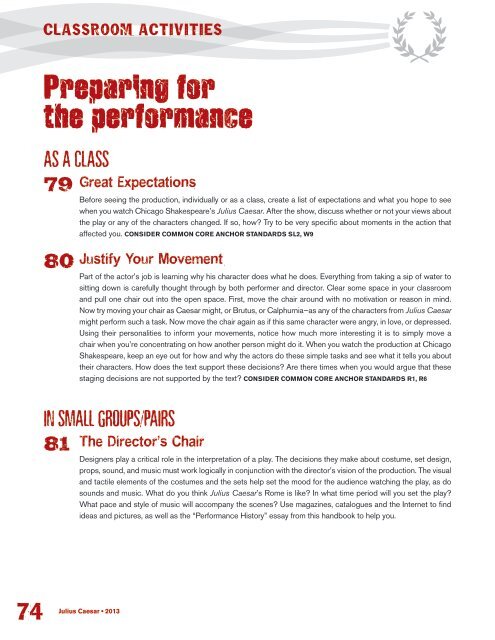Julius Caesar • 2013 - Chicago Shakespeare Theater
Julius Caesar • 2013 - Chicago Shakespeare Theater
Julius Caesar • 2013 - Chicago Shakespeare Theater
You also want an ePaper? Increase the reach of your titles
YUMPU automatically turns print PDFs into web optimized ePapers that Google loves.
74<br />
CLASSROOM ACTIVITIES<br />
Preparing for<br />
the performance<br />
AS A CLASS<br />
79<br />
80<br />
Great Expectations<br />
Before seeing the production, individually or as a class, create a list of expectations and what you hope to see<br />
when you watch <strong>Chicago</strong> <strong>Shakespeare</strong>’s <strong>Julius</strong> <strong>Caesar</strong>. After the show, discuss whether or not your views about<br />
the play or any of the characters changed. If so, how? Try to be very specific about moments in the action that<br />
affected you. CONSIDER COMMON CORE ANCHOR STANDARDS SL2, W9<br />
Justify Your Movement<br />
Part of the actor’s job is learning why his character does what he does. Everything from taking a sip of water to<br />
sitting down is carefully thought through by both performer and director. Clear some space in your classroom<br />
and pull one chair out into the open space. First, move the chair around with no motivation or reason in mind.<br />
Now try moving your chair as <strong>Caesar</strong> might, or Brutus, or Calphurnia—as any of the characters from <strong>Julius</strong> <strong>Caesar</strong><br />
might perform such a task. Now move the chair again as if this same character were angry, in love, or depressed.<br />
Using their personalities to inform your movements, notice how much more interesting it is to simply move a<br />
chair when you’re concentrating on how another person might do it. When you watch the production at <strong>Chicago</strong><br />
<strong>Shakespeare</strong>, keep an eye out for how and why the actors do these simple tasks and see what it tells you about<br />
their characters. How does the text support these decisions? Are there times when you would argue that these<br />
staging decisions are not supported by the text? CONSIDER COMMON CORE ANCHOR STANDARDS R1, R6<br />
IN SMALL GROUPS/PAIRS<br />
81<br />
The Director’s Chair<br />
Designers play a critical role in the interpretation of a play. The decisions they make about costume, set design,<br />
props, sound, and music must work logically in conjunction with the director’s vision of the production. The visual<br />
and tactile elements of the costumes and the sets help set the mood for the audience watching the play, as do<br />
sounds and music. What do you think <strong>Julius</strong> <strong>Caesar</strong>’s Rome is like? In what time period will you set the play?<br />
What pace and style of music will accompany the scenes? Use magazines, catalogues and the Internet to find<br />
ideas and pictures, as well as the “Performance History” essay from this handbook to help you.<br />
<strong>Julius</strong> <strong>Caesar</strong> <strong>•</strong> <strong>2013</strong>




